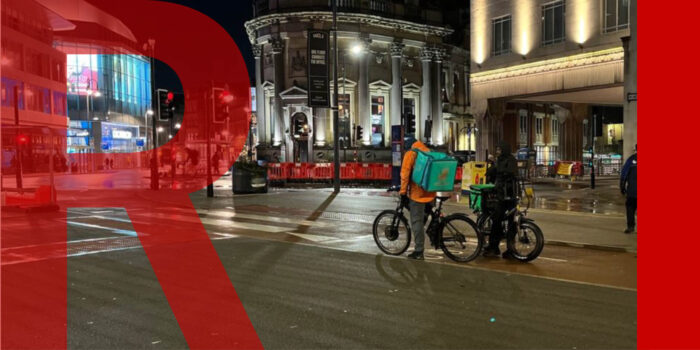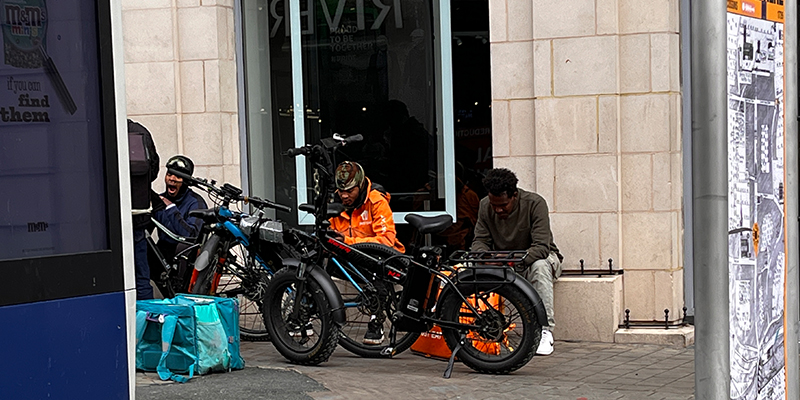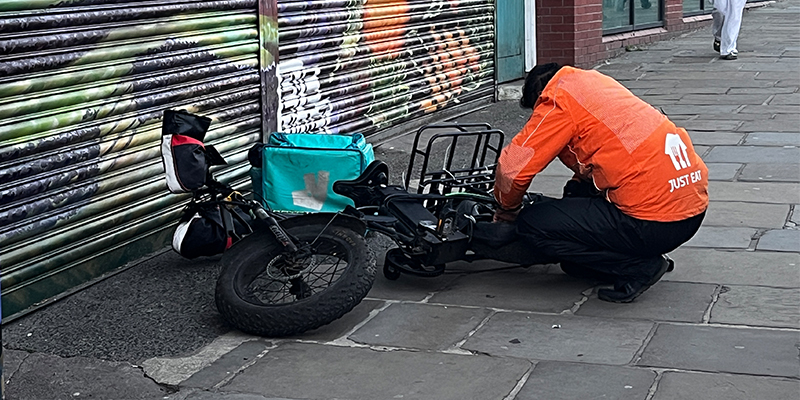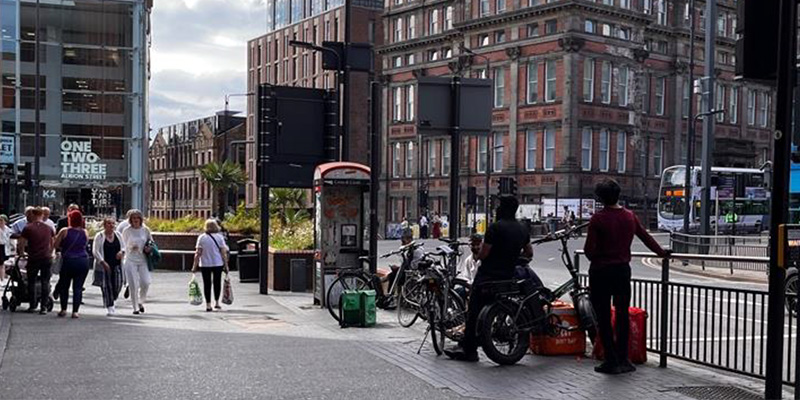Improving cycling infrastructure by listening to riders

To improve public access to Leeds and transform the experience of cycling on the city’s streets, one researcher bridged the gap between food delivery cyclists and policymakers.
Dr Morgan Campbell from the Sustainability Research Institute at the University of Leeds used her urban planning background and commitment to participatory research to co-develop a project with the aim of giving more voice to those who use the cycling infrastructure the most.
Her research empowered a typically marginalised community of workers, while also giving policymakers and planners access to their unique knowledge of cycling in the city to help improve West Yorkshire’s cycling infrastructure.
Impact
- Knowledge discovery: identified safety risks that were not visible in official data about cycle networks and delivery cyclists
- Community collaboration: gained insights by working alongside riders with first-hand experience of cycling in Leeds
- Local policy impact: collaborated with Leeds City Council to contribute to city and transport design.
Key information
- Major funders: Research England’s Participatory Research Fund
- Partners and collaborators: Leeds City Council: Travel Behaviour Change team
- Disciplines: geography, sociology and social policy, transport studies, sustainability
- Investigators: Dr Morgan Campbell.
In recognition of the need for a broader societal transition to low-carbon futures alongside clear health benefits of active travel, many local authorities in the UK are developing infrastructures that encourage residents to walk and cycle more. Leeds is one such example of a city that has, in recent years, significantly expanded its cycling network with long-term ambitions of being a city where you don’t need a car.
Since 2020, Leeds has delivered more than 8.5 km of new segregated cycle lanes, with more mileage built or currently being built across major corridors.
However, the growth in cycling has also brought challenges, particularly in terms of how different road users share public space. Tensions have emerged, with some members of the public perceiving certain cyclists as a nuisance or even a danger.
Among these, food delivery cyclists often attract the most criticism. As one of the most visible groups on the road, they are frequently blamed for unsafe behaviour. This often overlooks the pressures of gig economy work and the lack of dedicated infrastructure that safely supports their needs.
“More and more people are ordering food from services that bring a meal to your door in just a few taps of an app,” Morgan Campbell from the Sustainability Research Institute at the University of Leeds explained.
“It’s something I’ve really noticed increasing since I moved to the city in 2018, with a very different demographic, type of bike being used and narrative about bad cycling.”
In fact, demand for restaurant and grocery deliveries from the likes of Deliveroo, Uber Eats, and Just Eat soared during the pandemic, with the size of the UK market rising by 128 per cent between February 2020 and February 2021.
The lives behind the handlebars
Morgan was concerned by the increase in food delivery cyclists, narratives about bad cyclists, and the lack of outlets for riders voices.
“My research is in areas such as urban planning and governance on the one hand and mobility justice on the other—I usually try and use the latter as a way of informing the former. I’m fascinated by what people’s lived experiences can tell us about our built environments, and how we might better translate into more equitable and socially just cities,” she explained.
Having previously worked on projects exploring gender and safety with female bus conductors in Bengaluru, South India, for example, Campbell was interested to understand what daily life was like for those earning a livelihood in Leeds on two wheels.
“I was aware that there is often conflict between road users, with pedestrians and drivers alike complaining about how food delivery cyclists ride. But there isn’t enough understanding about the pressures they face as precarious workers in the gig economy,” Morgan said.

Waiting for orders (Morgan Campbell)
So while local authorities continue their efforts to encourage and enable more people to take up cycling for health, congestion or environmental benefits, there is so only so much they can do when it comes to outreach and engagement.
“Many riders for the big food companies are already marginalised. They are working long days and unsociable hours. English may not be their first language; given public perception of riders, they may not be comfortable engaging with authorities – despite them having a unique perspective of what our city is like to cycle in at all times of day,” Campbell said.
Getting attention and engagement
Spotting an opportunity to address two potential problems, Morgan secured support from Research England’s Participatory Research Fund, allowing her to investigate the subject further.
The project, Co-Producing the Leeds Cycle Network, was a partnership bringing together the University, Leeds City Council’s Influencing Travel Behaviour Team and local delivery cyclists with two set objectives.
“Firstly, I wanted to give riders a voice and empower them to share their stories about what it’s really like to move between the roads, the pavements and cycle lanes when delivering food against the clock,” Morgan said.
“And secondly, to establish opportunities that would connect those voices to the transport decision makers in our city. There is a fantastic effort amongst the Council to improve cycling infrastructure and cycling more generally in the city. However, it is difficult to engage with delivery cyclists who might be distrustful of local government and give policymakers and planners access to expert knowledge.”

Bike theft (Morgan Campbell)
Building relationships with riders took time, but they eventually began to share their experiences.
“They showed me videos on their phones of having bikes stolen, being followed by gangs armed with knives, receiving racist abuse; you name it,” she recalled.
Determined to share these experiences, as well as views of specific routes and infrastructure features, with the powers that be, Morgan sought opportunities to bring riders and Council members together.
“I’d say the real highlights of the project included a rider attending a Council meeting and speaking up about issues faced, co-creating a ride along with food delivery cyclists and the Council and a bike maintenance workshop with Leeds Bike Mill. The Council gave all their time in kind, and it was a fantastic opportunity for shared learning.”

Bike maintenance workshop with Leeds Bike Mill (Morgan Campbell)
Bringing new perspectives to the table
The riders who took part were able to describe hurdles they had to overcome every time they head out to work.
“For instance, the problem of broken glass in cycle lanes causing flat tires, which means riders have to return home for repairs and lose their wages,” Morgan said.

A rider trying to repair a tyre puncture (Morgan Campbell)
“Every rider I spoke to loves the bike lanes in the City Centre, it is infrastructure that increases a feeling of safety. But it’s important to understand that if a bike lane is poorly maintained or not as smooth a surface as the rest of the road, a rider won’t use it. Their job is to deliver fresh, intact food to a customer. They are not going to use infrastructure that puts this at risk.”

Well-maintained bike lanes in the city centre (Morgan Campbell)

Bike lanes aren’t always well-maintained, making the road the preferred option (Morgan Campbell)
Thanks to the project, issues such as these have highlighted issues such as theft, which remains a significant threat to delivery service riders and cyclists more generally, especially as the cost of an average bike increases.
Another significant challenge many riders face when working under their employers’ apps is the pressure to follow the ‘fastest’ route, which may not take into account local issues such as hills, blind junctions, closed cycle lanes or other factors that can make cyclists vulnerable.
“Many riders have to think twice about accepting an order if it means travelling through a neighbourhood they feel unsafe in. The average cyclist may choose a different, even longer route to avoid being targeted, but for a food delivery cyclist, the trade-off is a loss of earnings versus the potential theft of a £1500 bike.”

A happier, more understanding city
Funding for the Network has now ended, but Morgan is hopeful that the connections and dialogues it has sparked will have a long-term legacy in Leeds. She feels grateful to the Council for their genuine recognition of riders as important users of the cycle network and efforts to hear from them.
“By giving marginalised workers the chance to have their say at the table, we can build trust between key groups and ultimately share ideas that make our streets safer, nicer and happier places for everyone,” she said.
About Morgan Campbell
Morgan is a transdisciplinary researcher and lecturer whose work centres on the processes of urban transformation, with particular attention to the micropolitics of everyday life and the broader structures of power they reveal. Grounded in critical theory, cultural studies, urban planning, and design, Morgan draws from feminist epistemologies, post-colonial theory, critical urban geography, and participatory action research to explore how infrastructures, cultural norms, and policy intersect in shaping urban life. Their work critically examines who benefits from urban development and at what cost, especially through the lens of gender, class, caste, and labour.
Morgan’s doctoral research focused on transport and mobility in rapidly urbanising Indian cities, revealing how urban infrastructures and aspirations reflect and reproduce existing social hierarchies. By studying Bengaluru and Delhi, Morgan uncovered how metro systems, car ownership, and corporate transport both enable and restrict the mobility of women in ways deeply tied to capitalist labour structures and gender norms. Their research challenges dominant technocratic narratives by foregrounding urban sustainability as a question of justice and scale, while remaining committed to pedagogies of reflexivity and co-production as pathways to more inclusive and transformative urban futures.
